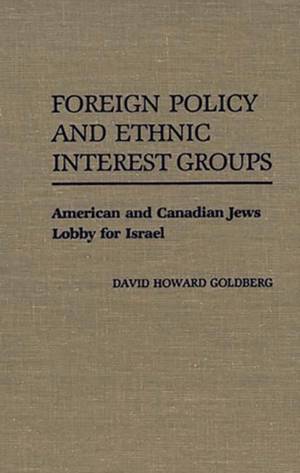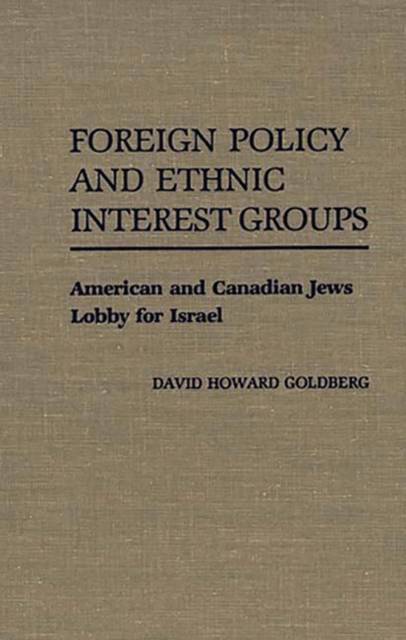
- Retrait gratuit dans votre magasin Club
- 7.000.000 titres dans notre catalogue
- Payer en toute sécurité
- Toujours un magasin près de chez vous
- Retrait gratuit dans votre magasin Club
- 7.000.0000 titres dans notre catalogue
- Payer en toute sécurité
- Toujours un magasin près de chez vous
Foreign Policy and Ethnic Interest Groups
American and Canadian Jews Lobby for Israel
David Howard Goldberg
127,45 €
+ 254 points
Description
The 1980s have witnessed increased concern over the impact of ethnic interest groups on foreign policy, particularly in the case of Jewish lobbying efforts in behalf of the state of Israel. In this study, Professor Goldberg presents a detailed comparison of American and Canadian Jewish lobbying organizations over the past fifteen years, offering a careful assessment of their influence on foreign policy decisions affecting the Middle East.
Professor Goldberg focuses primarily on the two most prominent Jewish foreign policy interest groups: the American Israel Public Affairs Committee (AIPAC) and the Canada-Israel Committee (CIC). He examines the response of these organizations to a series of crisis issues, beginning with the Arab-Israeli war of 1973 and including the current Palestinian uprising. Using a set of analytical criteria, he correlates their responses with the conduct of U.S. and Canadian foreign policy during the same period. His analysis shows how the variable successes and failures of the two interest groups have been influenced both by differences in the political systems in which they operate and their own internal political and organizational characteristics. In addition to presenting significant new information on the Israel lobby, this analysis provides a groundwork for future studies of ethnic foreign policy interest groups operating in varying political systems and cultures. This volume is a valuable resource for the Jewish community as well as scholars and professionals in Middle East studies, ethnic studies, foreign policy, and related fields.Spécifications
Parties prenantes
- Auteur(s) :
- Editeur:
Contenu
- Nombre de pages :
- 200
- Langue:
- Anglais
- Collection :
- Tome:
- n° 256
Caractéristiques
- EAN:
- 9780313268502
- Date de parution :
- 23-05-90
- Format:
- Livre relié
- Format numérique:
- Genaaid
- Dimensions :
- 164 mm x 244 mm
- Poids :
- 489 g

Les avis
Nous publions uniquement les avis qui respectent les conditions requises. Consultez nos conditions pour les avis.






